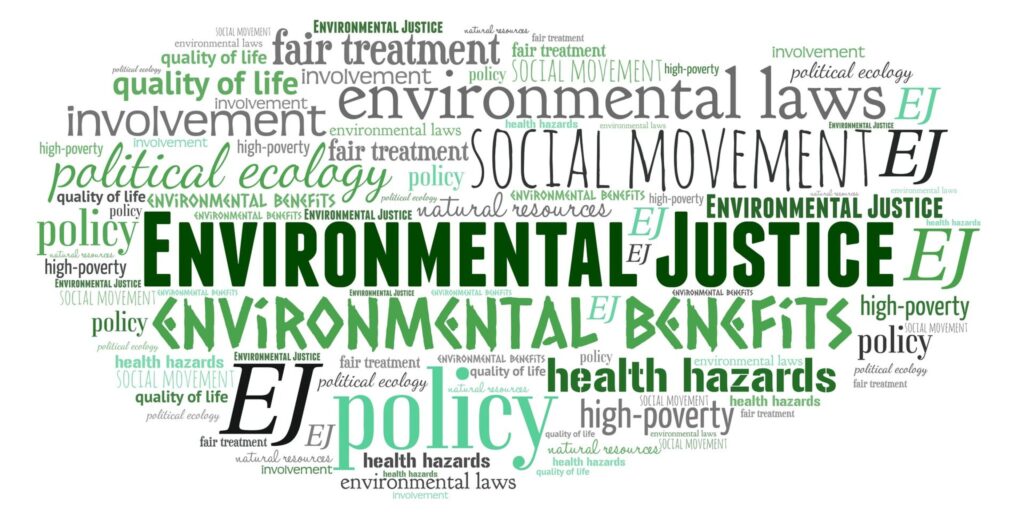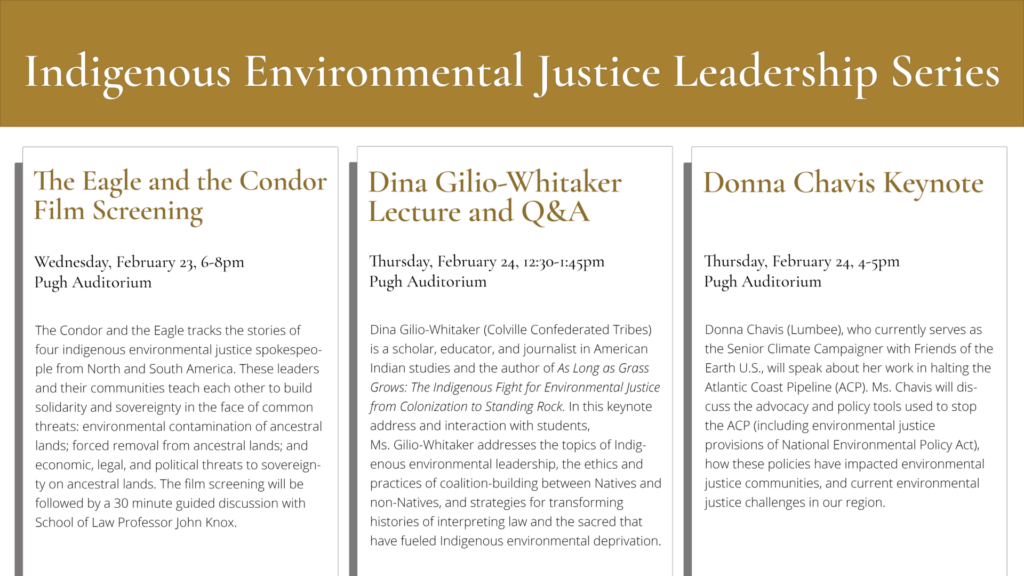Wake Forest to host Indigenous Environmental Justice Leadership series next week

On February 23-24, 2022, the Wake Forest University Intercultural Center and the Program for Leadership and Character will hold the Indigenous Environmental Justice Leadership series. The series consists of three events investigating the problems to which Indigenous environmental justice leadership responds, the forms this leadership takes, and the ethics of partnership for non-indigenous allies. It will open with a film screening of The Condor and the Eagle on February 23rd at 6:00 pm, followed by a lecture and Q & A session by scholar, journalist, and author Dina Gilio-Whitaker on February 24th at 12:30 pm and a 4:00 pm keynote address by renowned activist Donna Chavis, a member of the Lumbee tribe who lives here in North Carolina. Full descriptions of each event are available at the link above.
Environmental justice is not a new movement, but it is a timely one. “Environmental justice is a framework by which we can approach issues of the climate crisis, issues of environmental protection with a centering of marginalized people and voices,” explains Savannah Baber, Assistant Director for the Intercultural Center. It takes into account the experiences of people of color, including Indigenous people, who have historically been environmentally oppressed through appropriation of their land or housing policies placing them near sites of extreme pollution.
Environmental justice has been in the local news lately with the Weaver fire: according to an article in The News & Observer, about 77% of people living near the Weaver fertilizer plant are Black or Hispanic, and they live in a part of the city with poor air quality, exposing them to heightened risk of cancer caused by air pollution.This is just one example of environmental (in)justice; the Indigenous Environmental Justice Leadership series will explore others relevant to the WFU community, both locally and globally, such as the proposed Atlantic Coast Pipeline that speaker Donna Chavis campaigned against. In a major environmental victory, the pipeline was canceled in 2020, thanks largely to the work of Black and Indigenous communities in West Virginia, Virginia, and North Carolina.
The series will challenge participants to expand their definitions of leadership and the types of people they look to as leading voices on environmental issues. This fits into Wake’s broader goal of fostering discussions about environmental justice. This academic year the Office of Sustainability, for example, hosted a series of Tohi Talks in the newly revitalized Cherokee Garden on the southeastern edge of campus on Faculty Drive.

A number of Wake Forest professors also work on global environmental justice issues, among them CEES affiliates Rowena Kirby-Straker and Ron Von Burg, both professors in the Communications department. They are part of a team of WFU faculty, students, and staff working on a Knowledge Repatriation Project to return academic research on environmental issues back to small island states and other communities particularly vulnerable to the consequences of climate change. This semester, Kirby-Straker is also teaching a course called Community Narratives: Environmental Justice, which teaches students the basic principles and history of environmental justice, with a focus on narratives of environmental justice in North Carolina. “I’m very pleased that Wake students have this opportunity to hear from such distinguished environmental justice leaders. Students in my environmental justice course are thrilled that they get to interact with people so intimately involved with what we have been discussing in class,” she says about the upcoming event.
The event – particularly the Thursday afternoon session with Dina Gilio-Whitaker – is geared toward Wake Forest students, but the entire community is invited to join. “There’s a lot to be learned here, for the environmental movement more broadly, thinking about how so many of our laws themselves have come on to the books, with a very particular vision of what progress and growth mean,” says Ryan Juskus, Postdoctoral Fellow in the Program for Leadership and Character. “One of the things we’re hoping for this event is that by engaging with a number of Indigenous leaders, we will be able to help people grapple with some of those complexities and come away with actual tools and strategies for moving forward.”
Registration for the events is available here. Co-sponsors for the Indigenous Environmental Justice Leadership series include the Environmental Law Society, Commonplace, the Interdisciplinary Humanities Program, the Humanities Institute, the Center for Energy, Environment, and Sustainability, Graduate Sustainability Programs, the Department of Politics and International Affairs, the Race, Inequality, and Policy Initiative, and the Office of Diversity and Inclusion.
